The goal is to rollback all/any transactions in case of failure. But this doesn't work as expected.
We use Spring MVC + JMS + Service + Mybatis. In the logs, the JMS is set to rollback, but the row is inserted and not rollback. Would like to know what I'm missing or doing wrong?
The @Transactional tag was added recently. So not sure if it works as expected.
Code:
Service Class:
@Transactional(value = "transactionManager", propagation = Propagation.REQUIRED, rollbackFor = Exception.class)
public class DataExchangeLogic implements DataExchangeService {
private DataExchDao dataExchDao;
...
@Override
public void save(DataExch dataExch) throws ValidationException {
if (dataExch.getId() != null && dataExch.getId() > 0) {
this.dataExchDao.update(dataExch);
} else {
//LOGGER.debug("in insert::");
this.dataExchDao.create(dataExch);
//Empty exception throw to test rollback
throw new RuntimeException();
}
}
}
DAO:
public interface DataExchDaoMybatis
extends NotificationDao {
void create(DataExch dataExch);
}
Spring Context
<bean id="dataExchLogic" class="com.abc.service.logic.DataExchLogic">
<property name="dataExchDao" ref="dataExchDao" />
</bean>
EAR/WAR project Spring Context
<!-- Transaction Manager -->
<bean id="transactionManager" class="org.springframework.transaction.jta.WebSphereUowTransactionManager" />
<tx:annotation-driven transaction-manager="transactionManager" />
Logs:
[31mWARN [0;39m [36mo.s.j.l.DefaultMessageListenerContainer[0;39m # Setup of JMS message listener invoker failed for destination 'queue://REQUEST?priority=1&timeToLive=500000' - trying to recover. Cause: Transaction rolled back because it has been marked as rollback-only
org.springframework.transaction.UnexpectedRollbackException: Transaction rolled back because it has been marked as rollback-only
at org.springframework.transaction.support.AbstractPlatformTransactionManager.commit(AbstractPlatformTransactionManager.java:720)
at org.springframework.jms.listener.AbstractPollingMessageListenerContainer.receiveAndExecute(AbstractPollingMessageListenerContainer.java:240)
at org.springframework.jms.listener.DefaultMessageListenerContainer$AsyncMessageListenerInvoker.invokeListener(DefaultMessageListenerContainer.java:1142)
at org.springframework.jms.listener.DefaultMessageListenerContainer$AsyncMessageListenerInvoker.executeOngoingLoop(DefaultMessageListenerContainer.java:1134)
at org.springframework.jms.listener.DefaultMessageListenerContainer$AsyncMessageListenerInvoker.run(DefaultMessageListenerContainer.java:1031)
at java.lang.Thread.run(Thread.java:745)
[34mINFO [0;39m [36mo.s.j.l.DefaultMessageListenerContainer[0;39m # Successfully refreshed JMS Connection
[39mDEBUG[0;39m [36mo.s.j.l.DefaultMessageListenerContainer[0;39m # Received message of type [class com.ibm.ws.sib.api.jms.impl.JmsTextMessageImpl] from consumer [com.ibm.ws.sib.api.jms.impl.JmsQueueReceiverImpl@6ca01c74] of transactional session [com.ibm.ws.sib.api.jms.impl.JmsQueueSessionImpl@3ac3b63]
Creating a new SqlSession
Registering transaction synchronization for SqlSession [org.apache.ibatis.session.defaults.DefaultSqlSession@206ee277]
JDBC Connection [com.ibm.ws.rsadapter.jdbc.WSJdbcConnection@19b89f0c] will be managed by Spring
[39mDEBUG[0;39m [36mg.c.i.q.d.m.N.create!selectKey[0;39m # ==> Preparing: SELECT ID.NEXTVAL FROM DUAL
[39mDEBUG[0;39m [36mg.c.i.q.d.m.N.create!selectKey[0;39m # ==> Parameters:
[39mDEBUG[0;39m [36mg.c.i.q.d.m.N.create!selectKey[0;39m # <== Total: 1
[39mDEBUG[0;39m [36mg.c.i.q.d.m.N.create[0;39m # ==> Preparing: INSERT INTO TABLE ( COL1, COL2, COL N) VALUES ( ?, CURRENT_TIMESTAMP, ?, ?, ?, ?, ?, ?)
[39mDEBUG[0;39m [36mg.c.i.q.d.m.N.create[0;39m # ==> Parameters: 468(Integer), SYSTEM(String), 2017-03-01 00:00:00.0(Timestamp), 2017-03-16 00:00:00.0(Timestamp), true(Boolean), test 112(String), ALL(String)
[39mDEBUG[0;39m [36mg.c.i.q.d.m.N.create[0;39m # <== Updates: 1
Releasing transactional SqlSession [org.apache.ibatis.session.defaults.DefaultSqlSession@206ee277]
Transaction synchronization deregistering SqlSession [org.apache.ibatis.session.defaults.DefaultSqlSession@206ee277]
Transaction synchronization closing SqlSession [org.apache.ibatis.session.defaults.DefaultSqlSession@206ee277]
EDIT 1:
Controller code:
@ResourceMapping(value = "addNewDEURL")
public void addNewDE(@ModelAttribute(value = "dataObject") final DataExch dataExch,
final BindingResult bindingResult, final ResourceResponse response) {
if (!bindingResult.hasErrors()) {
try {
dataExchangeService.save(dataExch);
} catch (final ValidationException e) {
logger.error("A validation exception occurred.", e);
}
} else {
logger.error(bindingResult.getAllErrors().get(0)
.getDefaultMessage());
}
}
DAO changed:
public class DataExchDaoMybatis extends BaseDaoImpl implements DataExchDao {
public void create(DataExch dataExch) {
doSimpleInsert("insertDE", dataExch);
}
}
BaseDaoImpl:
public void doSimpleInsert(String queryId, Object o) {
SqlSession sqlSession = sqlSessionFactory.openSession();
sqlSession.insert(queryId, o);
}
